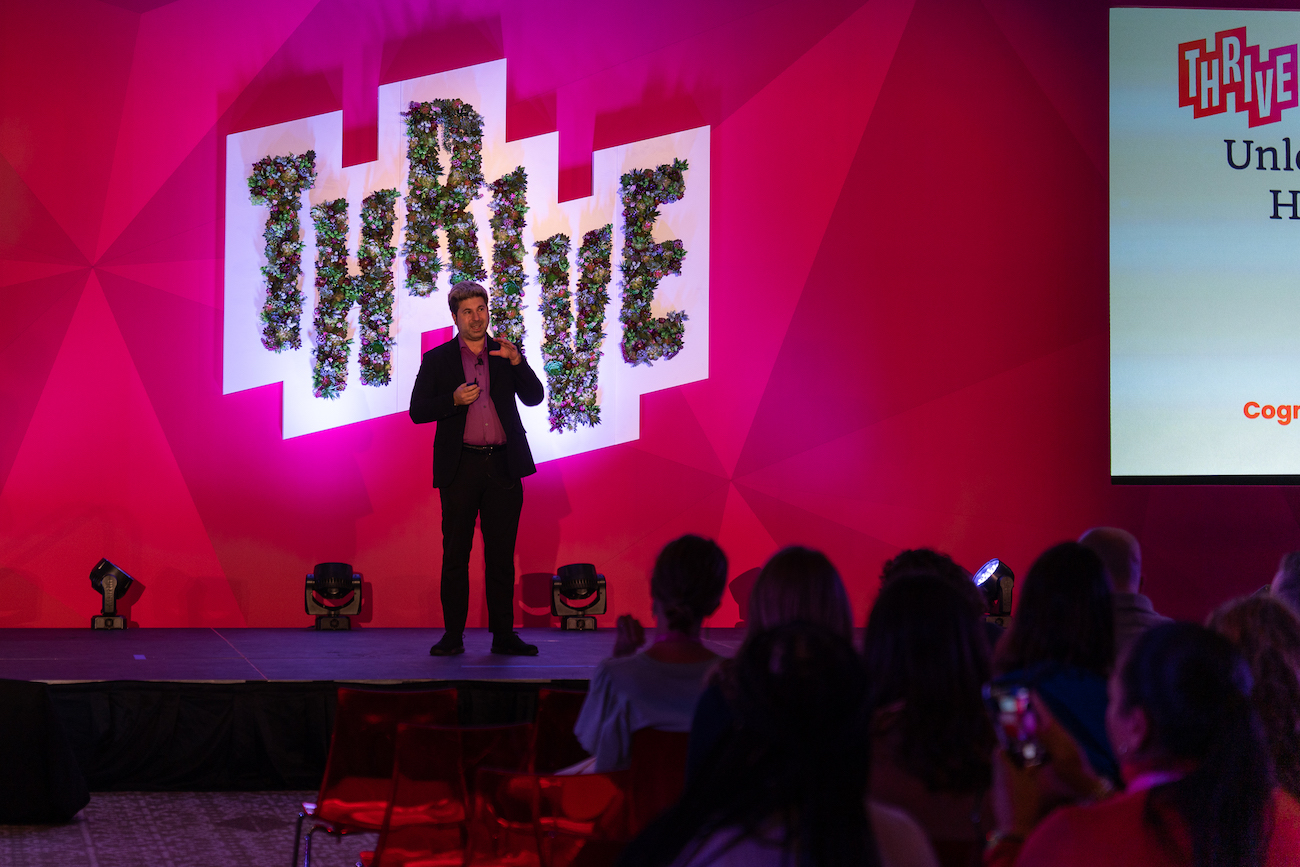What We Learned From Scott Barry Kaufman on The Science of Thriving at Work
Scott Barry Kaufman, Cognitive Scientist and Humanistic Psychologist and Founder, Center for Human Potential , delivered a keynote address at 15Five’s recent Thrive conference in Austin, Texas.
Passionate about human potential, Scott talked through many aspects of his research into personal development and fulfillment, from the value of effort over talent, to embracing inspiration in the workplace, to reframing Abraham Maslow’s famous hierarchy of needs.
Redefining Intelligence
Scott Barry Kaufman is perhaps best known for his work towards redefining intelligence. Defined simply, typical intelligence is our ability to apply knowledge and skills to practical situations; conventional IQ tests measure reasoning and problem-solving abilities.
But Scott believes intelligence is a more fluid and personal thing. “In 2013, I thought we needed a new definition of intelligence that really took into account the whole person,” he explains. “So I defined intelligence as the dynamic interplay of ability and engagement, in pursuit of personal goals.”
In this new paradigm, people reach their full potential — discovering the true intelligence they’re capable of — when engaged with work they find meaningful, interesting, and inspiring.
“It’s a feedback loop,” Scott continues. “The more that we engage in our interests and abilities, the more that we’re going to be able to actually achieve our potential.”
Reframing Maslow’s Theories of Self Actualization
Abraham Maslow is one of the best-known humanistic psychologists of all time — and Scott Barry Kaufman’s personal favorite.
Maslow is most famous for his hierarchy of needs. Often depicted as a pyramid, this framework begins with basic, physical needs like food and shelter, and moves through social and intellectual fulfillment to self-actualization and transcendence at the top.
Reframing how we understand this famous theory has been a central undertaking of Scott’s career — as well as bringing a renewed appreciation to some of Maslow’s lesser-known, underappreciated theories.
A New Metaphor for Human Needs
Did you know Maslow’s hierarchy isn’t actually a pyramid?
“Maslow never drew a pyramid!” Scott explains. “He made it very clear that life is not like a video game, where we reach one level and then go up to the next. It isn’t that simple.”
Instead, Scott proposes the sailboat metaphor. Those baseline needs are what keeps you afloat, or surviving — but to self-actualize is to open the sails, and actually venture out into the water.
“You don’t go anywhere if you stay in the boat your whole life,” he explains. “You can feel secure, get all your needs met, but you eventually have to open up that sail, and know the port you’re sailing to. That’s your long term goal. And on the way there, you have to be able to weather the storms.”
Characteristics of Self-Actualized People
Maslow’s work on self-actualization extends beyond the iconic hierarchy. After studying Maslow’s unpublished journals, Scott identified 10 characteristics of self-actualized people that can be measured using modern scientific methods.
These 10 characteristics of self-actualized people are:
- Creative spirit
- Authenticity
- Truth-seeking
- Acceptance
- Continued freshness of appreciation
- Peak experiences
- Good moral intuition
- Humanitarianism
- Equanimity
- Purpose
As part of his research, Scott created a self-test that anyone can use to explore how these traits manifest in their own life. It’s available free to everyone on his website, along with other self-actualization tests.
Inspiration in the Workplace
“Inspiration is a word you don’t see often in organizational psychology,” says Scott. “I try to introduce it into that world.”
Scott believes inspiration is critical not just to doing our best work, but to becoming our best selves.
Scott’s research has identified three main qualities of inspiration.
- It’s spontaneous, and without intention. It usually transcends self-serving goals and concerns
- It creates motivation, and excitement to start working on the thing that inspires you
- It’s set into action by a stimulus, or trigger
Other scientific research has found that being in a state of inspiration creates a sense of optimism for the future, and improves how people perceive their own competence.
“Going from an uninspired, to an inspired state changes how you see yourself,” Scott says. “It improves your view of what you’re capable of doing with your life.”
“One of the most powerful wellsprings of creative energy, outstanding accomplishment and self fulfillment seems to be falling in love with a future image of yourself — a dream for a possible future.”
Effort over Talent
To help us accomplish incredible things in the workplace, Scott shared something surprising: a mathematical formula developed by Angela Duckworth and her colleagues, and discussed in depth in a 2015 paper co-authored by Angela and Scott.
Expertise = Talent x Effort
“Distance, or how far you can go in life, is equal to talent times effort,” he shares. “Talent is important at the early stages — but effort counts more in the long run. That’s why we need to be rewarding effort, over talent, in the workplace. As a business leader, just know that if you select for effort, you’re selecting for greater achievement over the long haul.”
Thriving to reach our full potential
Self-actualizing, and realizing our full potential, is an inherently personal process.
“Trust your self actualizing compassion,” says Scott. “We all have this thing within us, that knows when we’re moving in the direction of growth.”
The goal is to change — but in service of becoming your most self-actualized self.
To sum up, Scott shares an unpublished quote by Abraham Maslow: “We try to make a rose into a good rose, rather than seek to change roses into lilies.”
Want to join us next year for Thrive 2023?
Sign up to get information about Thrive 2023 as soon as we can share it. Be the first to know about all things Thrive, with early access to registration, speaker announcements, and much more.




